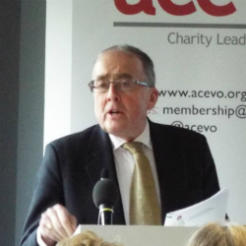Sir Stephen Bubb’s work at Acevo is a reminder of why mergers are not always a good thing, says Gareth Jones.
OK, Sir Stephen Bubb (pictured) is not really leaving us – he will be heading up a new research project on governance and leadership.
But it does feel like the end an era. One of, if not the most vocal advocate for the sector is stepping down as CEO of Acevo after 15 years.
Although he will no doubt still have plenty to say, he will no longer have the clout that comes with heading up the main representative body for charity chief executives.
Sir Stephen has not always been to everyone’s taste. His passionate belief that charities should be free to pay their trustees without obtaining the regulator’s permission is divisive to say the least.
He was also, arguably, over-enthusiastic about charities delivering public services at a time when others were more circumspect.
And when he began writing “Bubb’s Blog” in 2008, not everyone was impressed by his unashamedly lavish lifestyle, persistent name-dropping and apparent unwillingness to recruit policy staff who didn’t study at his own alma mater, Oxford University.
A vital role
However, his successor at Acevo will have big shoes to fill. While not all of Sir Stephen’s public comments are backed up with evidence and sober reflection, the sector needs someone to embrace the media and shoot from the hip on its behalf.
Journalists love simple viewpoints expressed in an engaging way, and if charities are to win back public trust, they must play the game.
Sir Stephen certainly does. His mobile number is freely available to any journalist that wants it, and he is always available and willing to give a lucid quote. He is not constrained by a PR team which slows down the process and extracts any colour from his comments.
And while I myself wouldn’t dream of calling Sir Stuart Etherington “a silly wally”, he has a point when he talks about the importance of making a noise about things that matter.
The urge to merge
The difference in emphasis between our two knights of the realm illustrates exactly why NCVO and Acevo should not merge, as some have suggested.
We absolutely need NCVO to provide the considered, evidence-based viewpoint and to gain the favour of politicians on “the inside track”. But we also need Acevo to complement it with instant, accessible hard-hitting commentary when the sector is under attack.
Lessons for the sector
This argument can be extended to mergers across the sector as a whole.
Yes, there may in some cases be duplication of effort where charities should merge. But we mustn’t forget that one of the things that makes the sector great is its diversity of provision.
Having multiple organisations working in similar fields allows services to be tailored to local or minority needs. It also encourages innovation – one organisation may pick up and run with an idea that another dismissed out of hand.
And thirdly, competition for funding and prestige drives organisations to improve.
Embracing disorder
The vast, disparate nature of the charity sector is what makes it great. It stands in contrast to the public sector, where too often inertia and vested interests hold sway.
Yes, the charity sector is messy – a loose and baggy monster, if you will – and as humans we have an innate desire for it to be tidier. But just like the private sector, its semi-chaotic diversity makes it a breeding ground for great ideas and initiatives.
I’m sure Sir Stephen would agree?









